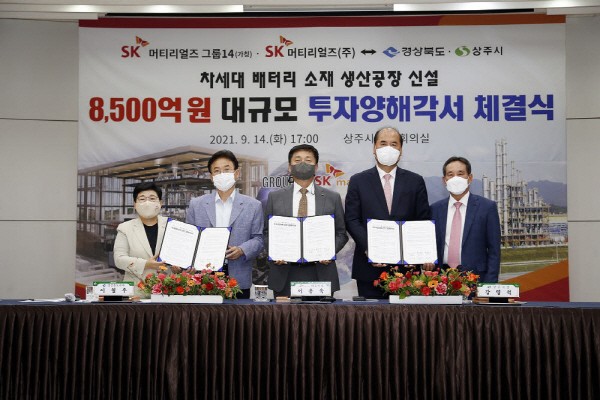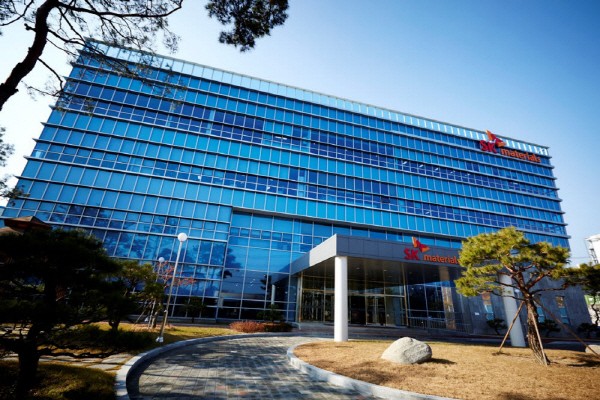
SK Materials will establish a silicon anode material plant in Korea, which is considered a next-generation battery material. Silicon anode material is attracting attention as a key material to improve the charging speed of electric vehicle batteries, and demand is rapidly increasing. The company plans to secure future growth engines by expanding its battery materials business such as anode material protection materials as well as silicon anode materials.
SK Materials Group 14 (assumed name) and SK Materials announced on the 14th that they had recently exchanged a memorandum of understanding (MOU) with Gyeongsangbuk-do and Sangju-si for the establishment of a 'silicon anode material and raw material production plant' at the site of the Sangju Cheong-ri general industrial complex.
SK Materials Group 14 is a company established by SK Materials in a joint venture with 'Group 14 Technology', an American battery anode material company.
The total investment for the establishment of the factory is 850 billion KRW. The two companies will invest 550 billion KRW to establish a silicon anode material plant in October. In addition, they will invest 300 billion KRW to establish a silane (SiH4) plant, the main raw material for silicon anode materials, and purchase a site.
Anode materials are the four core materials that make up secondary batteries along with cathode materials, separators, and electrolytes. It is responsible for increasing the charging capacity inside the battery and improving the driving range.
Silicon anode material is a material that can increase the charging speed by increasing the charging capacity up to 10 times that of the existing graphite anode material. In addition, it is advantageous for making small batteries due to its lightness and small volume. It can also be applied to information technology (IT) devices such as mobile devices and tablets, and ultra-small aircraft such as drones.
However, an anode material with increased silicon content may cause a fatal problem like the volume of the battery expands. SK Materials Group 14 minimized the problems of volume expansion and reduced lifespan by depositing a silicon anode material in a carbon nanotube (CNT) support. CNT are in the form of a hexagonal mesh, which effectively improves the volume expansion problem by adhering to the silicon anode material.
An official from the company said, “The charging capacity, initial efficiency, and lifespan have been remarkably improved. We are waiting for the evaluation of 30 customers including battery, electric vehicle, and IT companies.”
SK Materials Group 14 is discussing mass production supply after 2022 with customers.
Silicon anode materials are expected to have compound annual growth rate of 70% until 2025. SNE Research, a market research firm, predicted that the silicon anode material market will surge from 4,000 tons this year to 200,000 tons in 2030 as demand for electric vehicle batteries surges.
SK Materials Group 14 is also pushing for additional capacity expansion, starting with commercial operation next year. Manufacturing know-how, such as the establishment of an information and communication technology (ICT) solution-based 'human error' prevention system, will also be applied to the plant to enhance safety during the production process.
Youngwook Lee, president of SK Materials, said, "We will expand the industry to various battery materials, not just silicon anode materials, and raise the status of the K-battery material industry."
SK Materials plans to expand its battery material business area with CNT, binders, and additives, which are secondary materials for cathode and anode materials.
Meanwhile, SK Materials Group 14 is scheduled to be established this month with a capital of 77.2 billion KRW, with a stake of 75% in SK Materials and 25% in Group 14. Their headquarters will be in Seattle, USA.

By Staff Reporter Jiwoong Kim (jw0316@etnews.com)